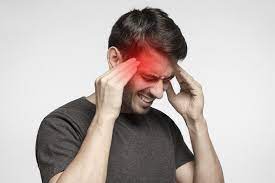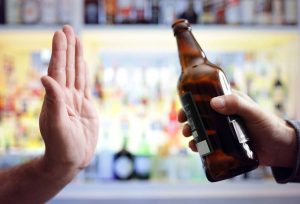When you drink alcohol heavily, you have a high chance of experiencing alcohol withdrawal when you try to cut down on drinking. Withdrawal is caused by your brain readjusting to the absence of alcohol. Once you have made drinking a habit, your brain becomes used to the effects of alcohol, and the presence of the substance in your body becomes normal. The moment you reduce your intake of alcohol, or not drink at all, withdrawal occurs as your brain gets “surprised” by the sudden absence of alcohol.
Read on to find out how long these withdrawal symptoms last.
Symptoms of alcohol withdrawal
Withdrawal symptoms range from mild to severe. Also, the symptoms vary from person to person. In 95 percent of people experiencing alcohol withdrawal, these symptoms are typical:
 Headache
Headache- Sweating
- Shaky hands
- Nausea
- Vomiting
- Insomnia
- Anxiety
- Heart palpitations
- Hallucinations
Delirium Tremens
Occasionally, in about five percent of withdrawal sufferers, they develop a more severe form of alcohol withdrawal known as delirium tremens. The symptoms of delirium tremens are more serious, and the condition can even turn fatal. Its symptoms include:
- Trembling
- Tremors (shaking in the hands and feet)
- Agitation
- Irritability
- Aggression
- Easily getting startled
- Confusion
- Profuse sweating
- High blood pressure
- Chest pain
- Fatigue
- Seizures
- Rapid heartbeat
- Visual, auditory, or tactile hallucinations
- Severe hyperactivity
- Increased sensitivity to light, sound, and touch
- Passing out
- Deep sleep lasting for 24 hours or longer
Delirium tremens can wreak havoc with critical functions of your body like breathing, temperature, and blood circulation. Left unchecked, they can lead to deadly complications like breathing difficulties, arrhythmias (irregularities in your heartbeat), electrolyte imbalances, or major seizures.
If you or someone you know is experiencing symptoms of delirium tremens, call for emergency medical help immediately.
Timeline of alcohol withdrawal
The withdrawal symptoms come in three stages. The first stage comprises mild symptoms, and it begins 6 to 8 hours after your last drink. Symptoms at Stage 1 include:
- Headache
- Anxiety
- Insomnia
- Shaky hands
- Upset stomach
- Heart palpitations
After 1 to 3 days of your last drink, you may progress to the second stage of withdrawal. It is also at this period that your symptoms will be most uncomfortable. Symptoms at Stage 2 include:
- Any or all Stage 1 symptoms, plus:
- High blood pressure
- Rapid heart rate
- High body temperature
- Rapid breathing
Withdrawal can continue 7 days after your last drink. This is Stage 3, and you will experience these symptoms:
- Any or all Stage 2 symptoms, plus:
- Visual or auditory hallucinations
- Disorientation
- Seizures
- Impaired attention
Without medical treatment, you can move from Stage 2 to Stage 3 much sooner.
Take note that this timeline is an average measure. The actual onset of each stage, as well as the different symptoms, can be different from person to person. Your own withdrawal timeline will depend on factors such as how long you have been drinking, how much you drink each time, pre-existing health conditions, and the presence of mental health problems, among others.
When do the withdrawal symptoms go away?
 If you do not seek medical care, alcohol withdrawal can last for weeks. But for most cases, the symptoms begin to subside after one week.
If you do not seek medical care, alcohol withdrawal can last for weeks. But for most cases, the symptoms begin to subside after one week.
Thing is, without the help of medical professionals in a guided detox process, you may not be able to beat the withdrawal symptoms. When they peak at day 1 to 3, you may feel so uncomfortable that you would rather go back to drinking than suffer further. For this reason, the huge majority of people who attempt to quit alcohol on their own do not succeed.
Persistent withdrawal is also possible in rare cases, where some symptoms can last for months. These include disturbances in sleep, mood changes, and fatigue.
What is the best way to deal with these withdrawal symptoms?
 If you are worried about withdrawal symptoms, chances are you are thinking of quitting your drinking habits. Quitting alcohol is best done through a full rehab program. One important part of many alcohol rehab programs is medically-assisted detox. The aim of detox is to clear your body of alcohol and most of its ill effects.
If you are worried about withdrawal symptoms, chances are you are thinking of quitting your drinking habits. Quitting alcohol is best done through a full rehab program. One important part of many alcohol rehab programs is medically-assisted detox. The aim of detox is to clear your body of alcohol and most of its ill effects.
During detox, doctors and nurses will monitor you closely throughout the whole process. They will make sure that the detox will be as smooth and painless as possible. In case you feel anything out of the ordinary, you can ask for help right away. Also, if any medical emergencies arise, they can give you immediate care.
Usually, alcohol detox involves medications to help you manage the withdrawal symptoms. Doctors commonly prescribe a class of drugs called benzodiazepines, which are known for their calming effects. These drugs also help stop the progression of withdrawal symptoms into life-threatening complications. Additionally, doctors may also give you anticonvulsants to stop seizures if you have them.
After detox comes the next phase of rehab, consisting of behavioral therapies. These aim to correct the thought patterns that contribute to your drinking habits. Alcohol abuse may be a coping mechanism for stressful situations. With behavioral therapies, you will be trained with healthy coping strategies that do not involve any addictive substance. Later on, you can actively avoid alcohol and live a sober lifestyle.
Detox, behavioral therapies, and other treatments are done in a rehab facility. Depending on how severe your addiction to alcohol is, you can either be in an outpatient or an inpatient rehab program. Outpatient rehabs give you the freedom to go back home after each scheduled session. For inpatient rehabs, you will stay inside a residential treatment facility for the whole duration of your treatment. This can last for one to three months, depending on your case.
If you are suffering from an alcohol addiction, and you want to quit while avoiding withdrawal, call your doctor or a mental health professional today. They can help you find the best treatment routes for your needs.
